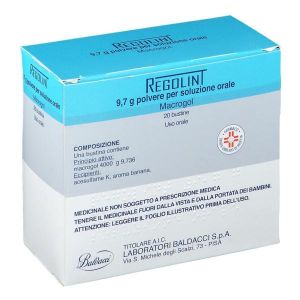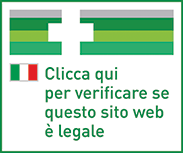Ship in Europe, Find out rates!
Regolint Powder 9,7 gr Macrogol 4000 Constipation 20 Sachets

- box Delivery in Italy in 24/48 and free returns
- star3.000+ positive reviews
- dropboxOver 60,000 products in the catalog
Macrogol 4000 based powder.
Therapeutic indications
Regolint is used in the short-term treatment of occasional constipation
Dosage and Posology
The drug should be taken according to the following doses and methods in adults and children over 8 years of age and weighing more than 20 kg: the daily dose must be adjusted according to the clinical effect obtained and can vary from one sachet to alternate days (especially in children) up to 2 sachets per day. Do not exceed the maximum daily dosage of 20 g of macrogol. The indicated dose should be adjusted based on individual response. The correct dose is the minimum sufficient to produce easy evacuation of soft stools.
It is advisable to initially use the minimum doses provided. When necessary, the dose can then be increased, but without ever exceeding the maximum indicated. The daily dose can be taken in one or two fractions, away from meals. If a sachet is to be taken, it must be taken in the morning. If you have to take more sachets, it will be necessary to divide the doses between morning and evening.
The effect of Regolint manifests itself in the 24-48 hours following its administration. Sometimes it can take two days (or more) for the desired effect to be achieved. In this case, continue the treatment bearing in mind, however, that laxatives must be used as infrequently as possible and for no more than seven days. Use for longer periods of time requires a doctor's prescription after adequate evaluation of the individual case. In children, in the absence of clinical data on dosing periods longer than three months, treatment should not exceed three months. Dissolve the contents of one sachet in at least 125 ml (equal to a glass) of water. Do not add any other ingredients. It is preferable to drink the entire quantity fairly quickly (within a few minutes) and avoid sipping it for a long time. A diet rich in liquids favors the effect of the medicine. The regularization of intestinal motility induced by the treatment must be maintained with a healthy lifestyle and proper nutrition.
Overdose
Overdose causes diarrhea which disappears with temporary interruption of treatment or dose reduction. Excessive fluid loss caused by diarrhea or vomiting may require correction of the electrolyte imbalance. Excessive doses can cause abdominal pain. Cases of aspiration have been reported when administering large volumes of polyethylene glycol and electrolytes with a nasogastric tube. Neurologically impaired children suffering from oromotor dysfunction are particularly at risk of aspiration. See also the information in the section “Special warnings and precautions for use” regarding the abuse of laxatives.
Contraindications
- Hypersensitivity to the active substance or to any of the excipients
- Serious inflammatory bowel disease (such as ulcerative colitis, Crohn's disease) or toxic megacolon, associated with symptomatic stricture
- Perforation or risk of perforation of the digestive tract;
- Ileus or suspected intestinal obstruction;
- Acute abdominal pain or of unknown origin;
- Nausea or vomiting, marked accentuation or reduction of peristalsis, rectal bleeding;
- Severe state of dehydration.
Side effects
Adverse drug reactions are listed by frequency using the following frequency categories: very common (≥ 1/10), common (≥ 1/100 to <1/10), uncommon (≥1 / 1,000 to <1 / 100), rare (≥1 / 10,000, <1 / 1,000), very rare (<1 / 10,000) and not known (cannot be estimated from the available data).
The undesirable effects listed in the following table have been reported in clinical trials involving 600 adult patients and from post-marketing data. Adverse reactions reported are usually mild in intensity and transient, mainly affecting the gastrointestinal tract. In case of hypersensitivity reactions stop taking the medicine and consult a doctor immediately.
- Gastrointestinal disorders
- Common: Abdominal pain Abdominal distension Diarrhea Nausea
- Uncommon: Vomiting Urgency to evacuate Faecal incontinence Rectal irritation
- Metabolism and nutrition disorders
- Not known: Electrolyte imbalance (hyponatraemia, hypokalaemia) Dehydration (particularly in the elderly) Immune system disorders
- Very rare: Hypersensitivity reactions (Pruritus, Rash, Urticaria, Edema, Face edema, Angioedema, Dyspnoea, Anaphylactic shock).
The undesirable effects listed in the table below have been reported in clinical trials involving 147 children aged 6 months to 15 years, and from post-marketing data. As in the case of adults, reported adverse reactions are usually mild in intensity and transient, mainly affecting the gastrointestinal tract. In case of hypersensitivity reactions stop taking the medicine and consult a doctor immediately.
- Gastrointestinal disorders
- Common: Abdominal pain Diarrhea *
- Uncommon: Vomiting Abdominal distension Nausea Rectal irritation
- Disorders of the immune system
- Not known: Hypersensitivity
* Diarrhea can cause perianal pain
Pregnancy and breastfeeding
There are no adequate and well-controlled studies on the use of the drug in pregnancy or breastfeeding. Therefore, the medicine should only be used in case of need, under the direct supervision of the doctor, after evaluating the expected benefit to the mother in relation to the possible risk to the fetus or infant.
Special warnings
Efficacy data in children less than 2 years of age are limited. The treatment of constipation with any medicine is only an adjunct to a healthy lifestyle and a correct diet, for example: • increase in the intake of fluids and vegetable fibers • appropriate physical activity and restoration of intestinal motility. Organic diseases must be excluded before starting treatment. Laxatives should not be used by people with acute abdominal pain or of unknown origin, nausea or vomiting, marked accentuation or reduction of peristalsis, rectal bleeding. The presence of one or more of these symptoms or signs requires an adequate diagnostic investigation by the doctor in order to exclude one of the pathological conditions that contraindicate the use of laxatives (for example: intestinal obstruction or suspected obstruction, intestinal stenosis or perforation, paralytic ileus, severe inflammatory bowel disease). After a 3-month course of treatment, full clinical supervision of constipation should be performed. The abuse of laxatives (frequent or prolonged use or with excessive doses), can cause persistent diarrhea with consequent loss of water, mineral salts (especially potassium) and other essential nutritional factors. In the most severe cases, dehydration or hypokalaemia may develop, which can lead to cardiac or neuromuscular dysfunctions, especially in the case of simultaneous treatment with cardiac glycosides, diuretics or corticosteroids. Caution should be exercised in the elderly, in patients with hepatic insufficiency, renal insufficiency, heart failure. In these cases it is advisable to periodically check the levels of serum electrolytes. The abuse of laxatives, especially contact laxatives (stimulant laxatives), can cause addiction (and, therefore, the possible need to gradually increase the dosage), chronic constipation and loss of normal intestinal functions (intestinal atony). Regolint, containing no sugar or polyol, can be taken by diabetic patients or on a galactose-free diet.
Expiration and retention
Check the expiration date indicated on the package. The expiry date indicated on the package refers to the product in intact packaging, correctly stored. Store in the original package in order to protect from moisture.
Warning : do not use the medicine after the expiry date indicated on the package.
Composition
One sachet of Regolint Powder contains:
Active principle
Macrogol 4000 g 9.736
Excipients
Acesulfame potassium, banana flavor.
| Destination | Cost | Detail |
|---|---|---|
| Italy | €5,90* | 24/72H |
| Austria, France, Germany, Slovenia | € 13* | 3 days |
| Belgium, Luxembourg, Portugal, Netherlands, Spain | € 14* | 4 days |
| Bulgary, Cechia, Hungary, Poland, Romania, Slovakia | € 19* | 5 days |
| Denmark, Estonia, Finland, Ireland, Lithuania, Latvia ,Sweden | € 22* | 5 days |
| United Kingdom, Switzerland, Greece, Malta/td> | € 30* | 7 days |
| Canada | € 40 | 7 Days |
European shipments with express courier: FedEx, MBE, DHL
*For the shipment outside band B ther's an extra cost of 22€ *For the shipment outside band C ther's an extra cost of 30€ Delivery Times exclude Saturday and Holidays
For Islands and Areas of difficult Accessibility the shipments are made in 72 hours and the cost will be increased by 15€


